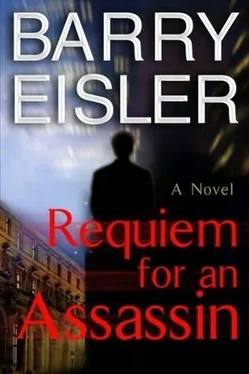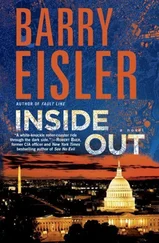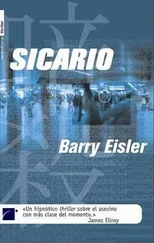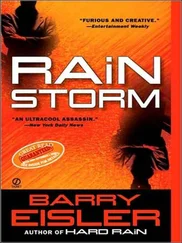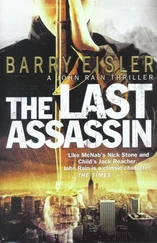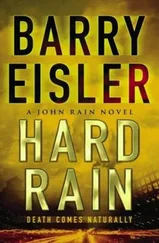“The chief raises his arms and cries out, ‘Kabunga!’ And once again, a dozen warriors rush out, and they have their way with this boy, and it goes on for an awful hour. Finally, it’s over. The chief looks at the third missionary and says, ‘What will it be, my friend? Death, or…kabunga?’
“Now this boy’s seen just about all the kabunga he can stand. And even though it’s against his religious principles, and even though he knows death is the end, he just can’t face kabunga. So he screws up all his courage, sticks out his chin, looks the chief straight in the eye, and says, ‘I choose death!’
“The chief raises his arms and cries out, ‘Death! But first, kabunga!’”
Boaz threw back his head and roared, and his hilarity was infectious. Within seconds, the inside of the van reverberated with laughter. As Dox had said, it had been a near, near thing. Laughter was one of the reactions. There would be others.
“Wait, wait,” Boaz said, wiping his eyes. “I’ve got one, too. These three missionaries…”
And it went on from there. I had a feeling we would be seeing Boaz again when all of this was done.
I didn’t mind the thought at all.
AT CHANGI, Kanezaki showed his credentials to a uniformed guard. The man spoke into a radio and waved us through the gate.
“That worked well,” I said.
Kanezaki called someone from his mobile. “We’re on our way,” he said. “Two minutes.” Then he glanced back at me and smiled. “Low friends in high places.”
We drove through another gate to the part of the airport I assumed was reserved for private planes. There were two dozen small jets parked on the tarmac. Kanezaki drove up to one of them. The hatch opened, and a young, crew-cut man came down the stairs. His back was ramrod straight, his civilian trousers were creased, and if he wasn’t a Marine, the Marines didn’t exist.
Kanezaki pressed a button and the van’s side door slid open. He got out and met the Marine around the side.
“Two to transport,” Kanezaki said. “Plus me.”
“Sir,” the Marine said, “I’m not authorized for other passengers.”
“Come over here,” Kanezaki said, and walked the man out of earshot. I watched them talking. Kanezaki gestured and spoke; the Marine nodded and listened.
After a minute, they came back. The Marine extended a hand to Dox. “Sir, can I help you aboard?”
“Yes you can, son, and I’m glad to see they sent the Marines. Just give me five minutes with these reprobates first, all right?”
“Yes, sir,” the man said, and stood off a respectful distance.
“Well, this is the VIP treatment,” Dox said. “What did I do to qualify?”
“The jet is part of a small CIA fleet,” Kanezaki said, “used to render very bad people to very secret places. You might have read a bit about it in the newspapers. And that’s all I’m going to say.”
“We know about the program,” Boaz said.
Kanezaki smiled. “I know you do. You’re part of it.”
“What did you tell the pilot?” I asked.
He shrugged. “Mostly I reminded him of the shame he would bear for the rest of his life if he flew off leaving a wounded Marine behind.”
“That would be me,” Dox said. “Hope you didn’t mention John here was Army.”
Kanezaki laughed. “I didn’t. It must have slipped my mind.”
I watched Kanezaki, strangely moved. He reminded me so much of Tatsu. The way he was willing to work outside the system to fix the system. The way he connived to make other people complicit in his nefarious means and noble ends.
“Am I right in assuming,” Boaz said, “that despite Jim Hilger’s surprising failure to be on the boat as we all expected, we all still want him to take…early retirement?”
“Hell, yes, you can assume that,” Dox said. He turned to me. “Do you know where to find him?”
“Feel free to ask me after we’re on the plane,” I said. “You know, when we’re not right in front of a foreign intelligence operative.” I looked at Boaz. “No offense.”
Boaz smiled. “None taken.”
“I don’t care if Boaz is from Mars,” Dox said. “I’d trust him to watch my back anytime. And I hope he’d trust me to watch his.” He looked at Boaz, who nodded back. “Plus the man appreciates a good joke. Unlike some people I could mention, despite their possession of other positive attributes. So tell me: where do we find this miserable, trouser-shitting little dick-puller of a whining, chickenshit, yellow-bellied, squealing, pissing, piglet motherfucker and put him down like the rabid dog he is?”
Boaz looked awed. Before he could ask Dox to repeat it all with annotations, I said, “‘We’ don’t find anyone. You can barely walk. From the way you’re breathing, your ribs are probably broken and morphine is masking the worst of it.”
“It’s just a flesh wound,” Dox said with a grimace. “I’ve had worse.”
“You lie,” Boaz said, in a weird British accent. The two of them broke up, Dox half laughing, half groaning. I didn’t get it.
When they stopped, Boaz said, “It’s true I’m a foreign intelligence operative. But that’s my, what do you call it, a day job. This operation…let’s just say, it wasn’t sanctioned by my organization.”
“What do you mean?” I said.
“Naftali. He’s Gil’s brother.”
“I’ll be damned,” I said. “I thought he looked familiar.”
“Yes, he looks a bit like Gil. And he’s dangerous like Gil. He doesn’t think our management has been sufficiently motivated about avenging his brother’s death.”
“That’s management for you,” Dox said. “If they’re not doing nothing, they’re overreacting. Never anything in between.”
“You’re on your own on this?” I asked Boaz.
He shrugged. “Certain people…are happy to look the other way while Naftali and I are on vacation. You know how it works. Sometimes people want something done, but don’t want to know about it. They don’t want their fingerprints on it. I believe America’s former defense secretary Rumsfeld was known for this. The ‘rubber glove syndrome.’ No fingerprints, no attribution.”
“Christ,” I said, “doesn’t anyone just work for the government anymore?”
Dox groaned. “I told you once, man. Privatization is the wave of the future. Hey, you don’t think we still have a shot at Hilger here in Singapore, do you?”
I shook my head. “I doubt Hilger goes to the grocery store for a quart of milk without five different currencies and three different passports. He’ll come back to the yacht club, hear the sirens, and just melt away.”
Kanezaki said, “And we can’t wait for him at the club. It’s too hot right now. We can’t go back.”
“All right, forget Singapore,” Boaz said. “But if you have information about where we can find Hilger after this, Naftali and I will act on it. Privately, discreetly, and immediately. You can count on that.”
Kanezaki shrugged. “These secrets always get out sooner or later anyway,” he said, and Boaz grinned.
I wasn’t surprised. Kanezaki wanted Hilger dead enough to bring me in for it. Why not the Israelis, too? And it wasn’t as though he would be sharing classified intel. Everything he knew on this op, he had generated with me.
Kanezaki briefed Boaz on what we knew. When he was done, Boaz said, “So this port security guy in Amsterdam, Boezeman, you think he’s integral to whatever Hilger is planning.”
“That’s right,” Kanezaki said.
“And you have his particulars? Work and home addresses, telephone numbers, photographs?”
“Of course.”
“Who is Hilger working for?”
“I don’t know. There are a lot of groups that would love to take down the refineries at Rotterdam. AQ, Hamas, Hezbollah…and Hilger is mixed up with all of them.”
Читать дальше
